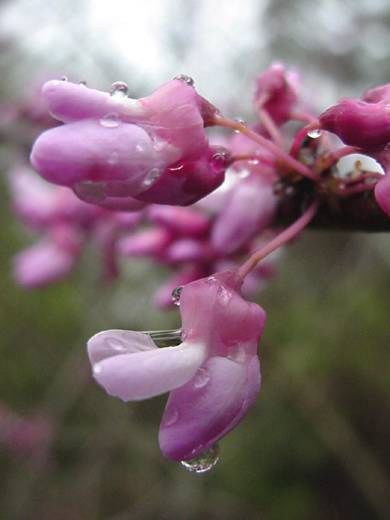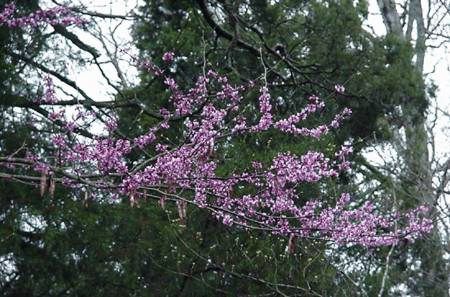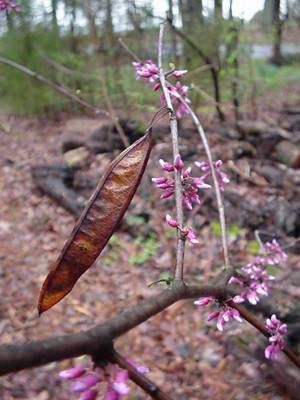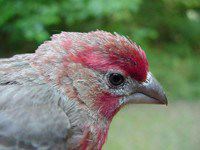 HOME: www.hiltonpond.org |
|
||
|
|
|||
|
|
|||
|
|
|||
|
|
|||
|
|
|||
|
THIS WEEK at HILTON POND |
 Last week while lamenting the lack of early spring wildflowers at Hilton Pond Center, we committed a grave but unintentional injustice against the biggest blooming plants on the property: the trees. Yes, trees are wildflowers, too, they just don't happen to be "spring ephemerals" that wither way after flowering. In fact, this week it became very apparent that one of our most attractive spring blossoms is that of the Eastern Redbud. Among our native trees at Hilton Pond Center, only Red Maples (Acer rubrum) beat out Eastern Redbuds (Cercis canadensis) at having the earliest noticeable flowers. The maples start blooming in early February, but come mid-March, redbuds take over with their flashy, lilac-pink blossoms (above). True, Hazel Alder shrubs (Alnus serrulata) around the pond unfurl their catkins some years as early as January, but redbuds are by far our showiest early tree-borne "wildflowers." The Eastern Redbud--not to be confused with leathery-leaved California Redbud (C. occidentalis)--grows from southern Ontario into North Florida, and west to central Texas; populations even occur in the interior mountains of Mexico. Redbuds typically frequent riparian habitats but can be found in moist woods, often along with oaks (Quercus spp.), hickories (Carya spp.), pines (Pinus spp.), and Flowering Dogwood (Cornus florida). In any case, they are a tree of the understory, seldom reaching more than 25-30 feet in height. Redbuds, like most legumes, are relatively short-lived, but their fast growth and resistance to disease make them useful as ornamentals. Eastern Redbud is sometimes called "Judas-tree" because early settlers noticed its resemblance to similar tree by that name from Europe and Asia--a tree that Judas Iscariot supposedly hung himself from after his betrayal of Christ.
 If you enjoy "This Week at Hilton Pond," please help Support Hilton Pond Center for Piedmont Natural History |
 One look at Eastern Redbud's flower quickly reveals it to be a legume, i.e., a member of the Pea Family (Leguminosae); and if the flower doesn't give away its taxonomy, a glimpse of the "pea pod" of the redbud surely will (right). These 2"-4" pods, which contain several brown-black seeds, ripen in mid-summer and typically fall from the tree in great numbers, thereby assuring a new generation of redbuds. Judging from the piles of last year's pods that still litter the ground this spring, redbud seeds must not be high on the list of sought-after wildlife food at Hilton Pond Center. The seed pod photo above also reveals an unusual redbud feature: its flowers occur in clusters that arise directly from nodes on older twigs--quite different from many trees that produce blossoms only from the ends of their branches.
One look at Eastern Redbud's flower quickly reveals it to be a legume, i.e., a member of the Pea Family (Leguminosae); and if the flower doesn't give away its taxonomy, a glimpse of the "pea pod" of the redbud surely will (right). These 2"-4" pods, which contain several brown-black seeds, ripen in mid-summer and typically fall from the tree in great numbers, thereby assuring a new generation of redbuds. Judging from the piles of last year's pods that still litter the ground this spring, redbud seeds must not be high on the list of sought-after wildlife food at Hilton Pond Center. The seed pod photo above also reveals an unusual redbud feature: its flowers occur in clusters that arise directly from nodes on older twigs--quite different from many trees that produce blossoms only from the ends of their branches. Eastern Redbud's colorful "wildflowers" soon will fade at Hilton Pond Center, but they will be replaced in short order by tiny heart-shaped leaves in a delicate shade of green--a green that can only be associated with the passing of winter and the wonderful joys of spring.
Eastern Redbud's colorful "wildflowers" soon will fade at Hilton Pond Center, but they will be replaced in short order by tiny heart-shaped leaves in a delicate shade of green--a green that can only be associated with the passing of winter and the wonderful joys of spring.

